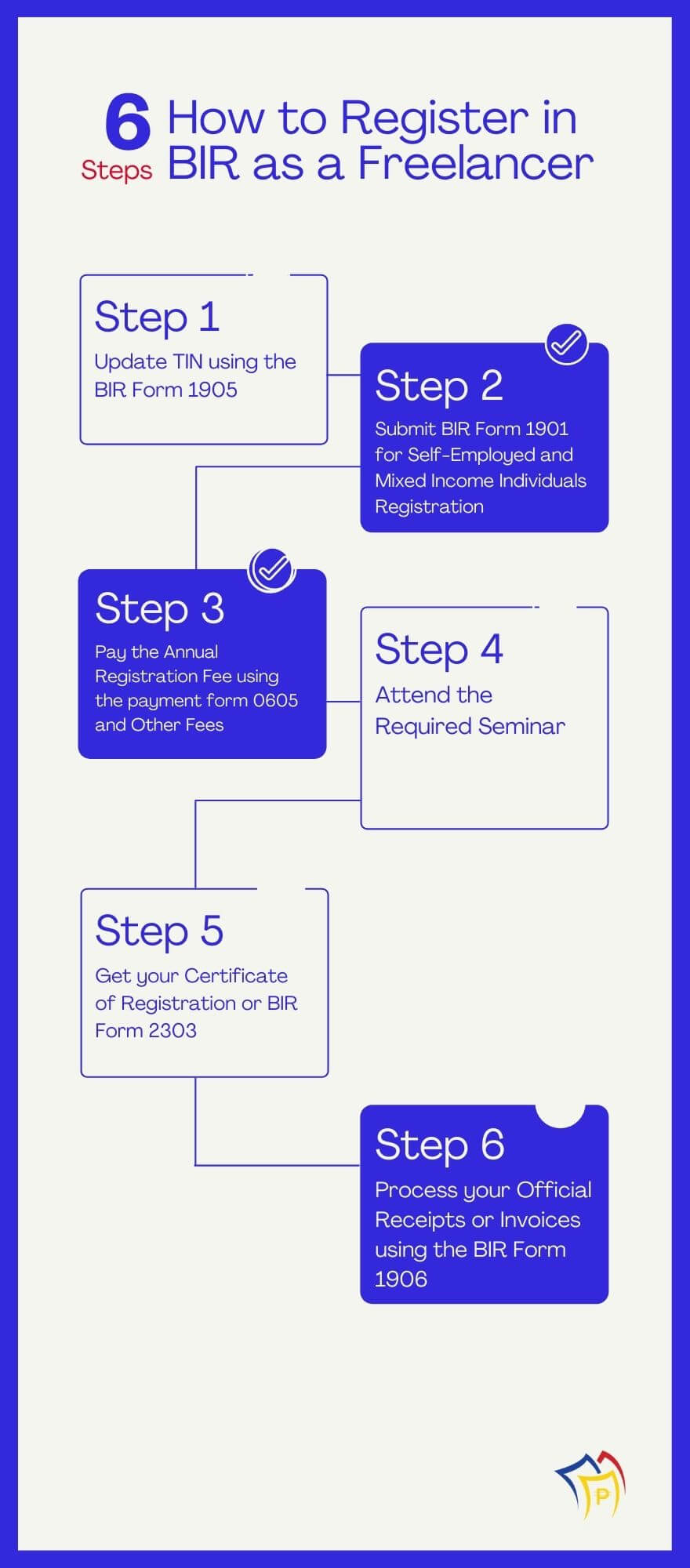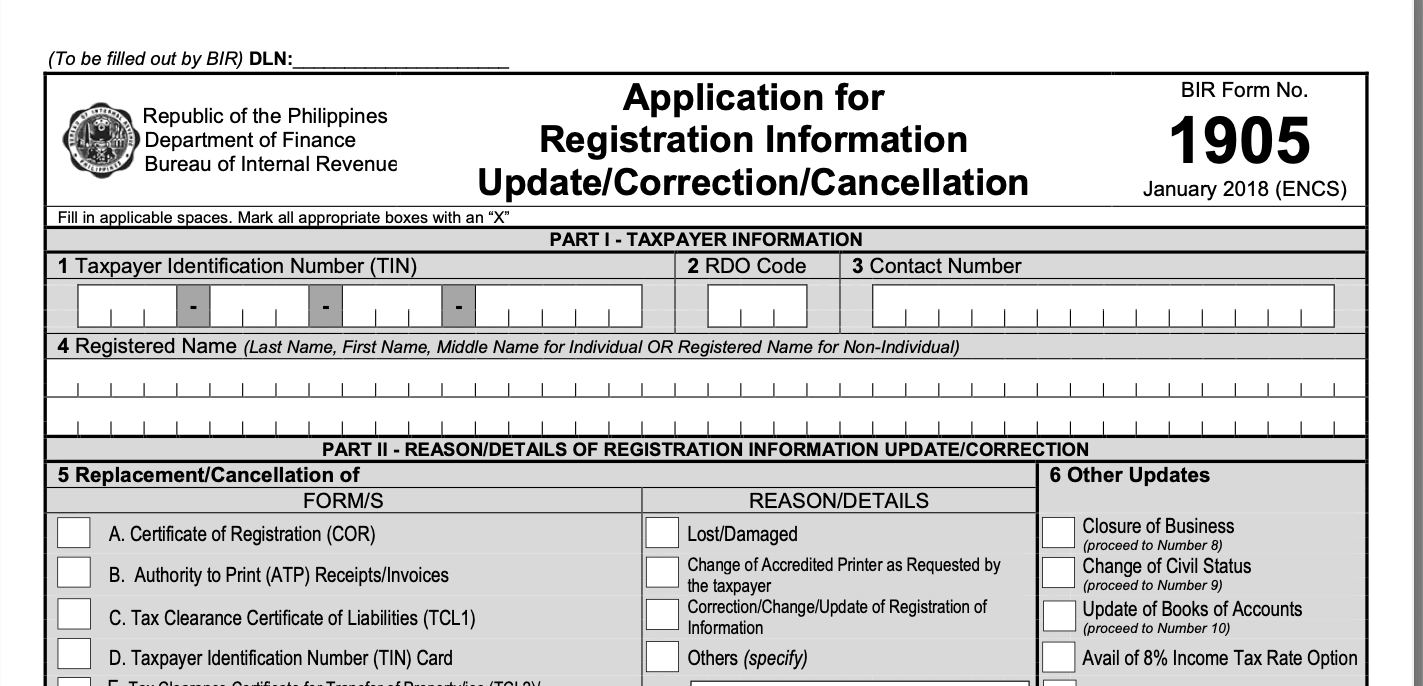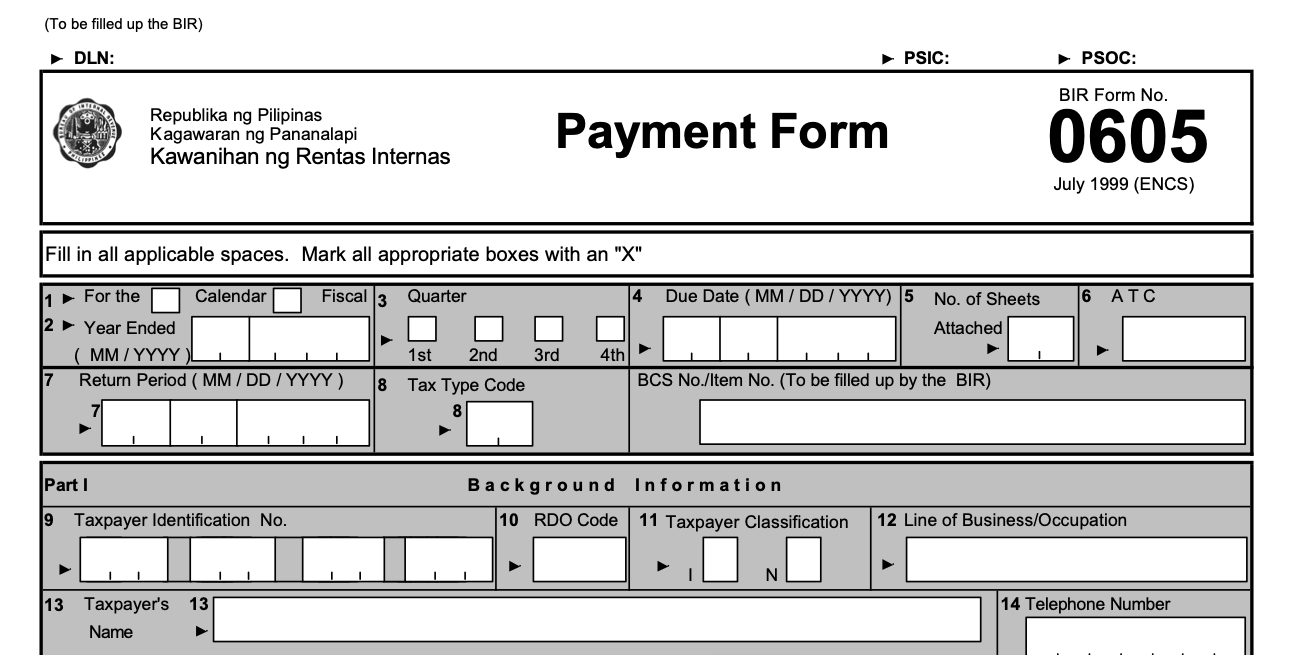Are you a freelancer? Are you planning to become one? If so, then this blog post is for you! In this step-by-step guide, we’ll show you how to register in the BIR as a freelancer. So whether you’re just starting out or are already in business, make sure to read on!
How to register in BIR as a freelancer! What is the best thing about being a freelancer? Spending time with your family? No commute, dress code, or irritating workmates? Or is it the fact that you get your salary without deductions?
If your answer is the no deduction salary, which has been tax-free since we have some news for you, this is about to change!
Learn BIR Registration for Self Employed and Freelancer 2021!”]The fact is, even before the 2018 Tax Reform for Acceleration and Inclusion Law (TRAIN), everyone (including freelancers) was supposed to pay taxes. Whether online or offline, work as a freelancer, the BIR categorizes you as professional and self-employed. Find out how to register in the BIR as a freelancer 2021.
How to Register in BIR as a Freelancer: Step by Step Guide
The process below is only applicable for individual freelancers and not for companies or firms.
Step 1: Update TIN using the BIR Form 1905
This step is applicable if you have an existing TIN from your employer. To register as a freelancer, you have to fill up the BIR Form 1905 to update from employee to self-employed. However, if you’re still working and at the same time as a part-time freelance, you can register as a mixed-income earner.
If you have any changes to your status or dependents, make sure to update your personal information. In addition, if there is a change of address, you also need to update or transfer your RDO.
Then, how can you transfer your new address or RDO? There are two ways to do that. First, you can fill up the BIR Application for Registration Form 1905 in your new RDO or existing address. Second, you can request a transfer of RDO from your old RDO.
Check out these lists of Regional/District Offices.
Step 2: Submit BIR Form 1901 for Self-Employed and Mixed Income Individuals Registration
You have to print two copies and submit the form. Download the Application for Registration Form 1901 here.
Step 3: Pay the Annual Registration Fee using the payment form 0605 and Other Fees
Form 0605 is for payment for printing receipts, invoices, and proof of annual registration fee. This form should be printed into three copies and pay the yearly registration fee of five hundred pesos (500.00) either in the BIR cashier’s window or to any accredited bank within your RDO.
Do you want to earn dollars up to $10 per day without website? Click here to learn!
Take note that the annual registration fee is paid every year in January. In renewing or paying the yearly registration fee, you must attach the following documents:
- BIR Form 1901 (Application for Registration)
- BIR Form 1905 (Application for Registration Information Update)
- Barangay Certificate upon payment.
Aside from paying the annual registration fee, you must also pay the certification fee of fifteen pesos and the documentary stamp tax of fifteen pesos. After payment, you will receive the following documents that should be attached to the Certificate of Registration
- Payment receipts
- Taxpayer’s verification slip
- BIR Form 1901
- BIR Form 0605
Step 4: Attend the Required Seminar
This step is necessary for you to know your rights, penalties, and responsibilities as a taxpayer. Attending this seminar will widen your knowledge in filing your income tax correctly. If you cannot participate in the seminar, you can still ask any officer in charge for your concerns and clarification.
You can also read how to reduce taxes legally and other information needed to be acquainted with filing taxes.
Step 5: Get your Certificate of Registration or BIR Form 2303.
Get back to your RDO to get a certificate of Registration, including the “Ask for Receipts” notice and Authority to Print (ATP).
Step 6: Process your Official Receipts or Invoices using the BIR Form 1906
Freelancer is also required to issue an official receipt for client earnings, including international clients. A BIR-accredited printing press should print these receipts.
Here are the documents needed in printing official receipts.
- BIR Form 1906
- Valid ID or any government-issued ID
- BIR Form 0605 with proof of payment
- Photocopy of Certificate of Registration and payment receipts
- Barangay certificates
Processing BIR Official receipts may take many days before you can issue official receipts. These receipts are valid only for five years.
Note: Once you get your Authority to Print, you should print the official receipts within thirty days because beyond 30 days, you need to secure ATP again from the BIR.
Important reminders: After getting the COR, you must secure ATP; non-compliance will be subject to one thousand (1,000) penalty. If the ATP expired, you would be subject to a 10,000, and the non-issuance of official receipts will be subject to a 21,000 penalty.
As an online freelancer, you must have the book of accounts to record the income and other necessary transactions using these journals and Ledger. You must register these books and have them signed and stamped by the RDO.
Once you start your business as a freelancer, make sure to issue official receipts and keep your books updated to avoid penalties. To more on how to avoid penalties, check this out.
Unlike traditional corporations who automatically deduct tax from their employees, the only difference is that you need to register as a “self-employed” taxpayer by yourself.
Before you think of all the reasons why you’d rather stay behind the BIR radar and not register, consider some benefits:
The benefit of Registering as a Freelancer with the BIR
1. Proof of earnings
One of the common requirements when applying for loans from banks or the SSS is your annual tax return (BIR Form 1701). It serves as proof of your earnings and will also come in handy when applying for credit cards.
2. Legitimacy
Registering with the BIR means you get to send clients official receipts with your name on them. Not only does this increase your legitimacy but builds clients’ trust that you are a credited business.
3. Avoiding charges of tax evasion
The fact is as long as you are rendering any form of service and earn money from it, you are expected to pay tax. Failure to do this is punishable by law under Section 74 of the National Internal Revenue Code of 1997
4. Being a Responsible Citizen
Paying tax is the ethical duty of every citizen of the Philippines, and knowing that you fulfilled your responsibility is satisfying.
Who is considered as “Self-employed” individuals?
In the Philippines, you are considered a “self-employed” individual if you fall into either of these two categories:
1. You are deriving professional income from your profession
It includes lawyers, doctors, dentists, certified public accountants (and others registered with the Professional Regulation Commission (PRC). In addition, those “who pursue art and make their living from there” such as athletes, writers, graphic designers, and other popular freelancing jobs.
2. You own a business and derive income from that business
Freelancers mostly fall under the first category, so whether you are a virtual assistant, content writer, vlogger, blogger, podcaster, social media manager, etc., you are considered self-employed.
Before we get into the details on registering as a freelancer, remember that processes will differ per BIR RDO location. You need to make sure you confirm the requirements at your local BIR Revenue District Office (RDO).
General Freelancer Registration Requirements
1. TIN (Tax Identification Number)
If a corporation previously employed you, you could quickly get your TIN from your previous employer. They can access the BIR eReg database and follow the steps here if they don’t have one. TIN, learn how to get one here.
2. RDO (Regional District Office)
You need to make sure that your TIN is in your current RDO and includes your home address. If the address is different, you’ll need to transfer your RDO using BIR Form 1905.
3. Birth Certificate
Make sure to have a photocopy of your birth certificate handy to submit to the BIR. If you don’t have a birth certificate, you can order it online or request it from your PSA office.
4. Government ID
This I.D should have your address, name, and birth date.
5. Barangay Certificate
Make sure that your Barangay Certificate states that you are working as a freelancer.
6. PRC I.D (when applicable)
7. Professional Tax Receipt (only applicable for licensed professionals)
8. BIR Form 1901
It is the Application of Registration, and you’ll need to fill up two original copies.
9. BIR Form 0605
You’ll need three original copies for the Payment for Application of Registration
10. BIR Form 1905
You’ll only need this if you need to change your RDO location.
11. Book for Accounts
Freelancers only need two books of accounts- Journal and Ledger.
- January 30 for the payment of the annual registration fee
- April 15 for annual income tax
- May 15 for payment of the first quarter
- August 15 for the second quarter
- Lastly, November 15 for third-quarter income tax
DID YOU KNOW!
A freelancer is different from a sole proprietor. A sole proprietor is engaged in selling and buying activities, while a freelancer is involved in services. The sole proprietor could be subject to business tax, while the freelancer is only subject to income tax.







How can I process my own tin self imployed
You have to do is register with the BIR. Use your TIN in registering your business with the BIR.
panu kumuha ng tin id
panu kumuha ng tin id kukuni. kulang po ung tin number ko nkalimutan ko kse
punta ka sa any BIR Branch near you, have a valid government ID with you, mag TIN verification ka lang kamo, do not get another TIN as this is punishable by law.
If you want your TIN to be transferred sa current place of residence, go to the nearest branch near you, then apply for transfer by filling up all information required in BIR form 1905
Can the status update be made right before you file taxes?
How about services such as Executive Driver? Can he register as a self-employed/freelancer?
It depends as to extent of your services. You can either register as self-employed if you want to expand your business however, if you maintain as driver then register as freelancer.
How and when will the RDO stamp your journal and ledger?
Once you got your COR then you can bring your books to the RDO for stamp.
How do you fill-out the ledger for freelancer? Do you have separate video about it?
I am currently registered as a freelancer with BIR, but will become a full time employee starting February 2023 (no expected income for January 2023)
How do I proceed with changing my registration from self-employed professional to full time employee, given that January is also the time for updating of registration with BIR?
Can I just submit BIR Form 1905? Do I also need to prepare form 0605 and make payments?
What are the documentary requirements needed apart from submitting my original Certificate of Registration? I recall that when I changed from full time employee to self employed professional several years ago, I was also asked by our RDO to submit an affidavit declaring that I am a self employed professional. Does that apply if I change back to full time employee?
Also do I need to apply for cancellation of authority to print receipts or will that be automatic upon changing my registration type?
Thank you in advance!